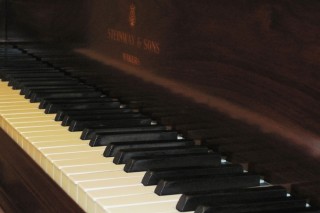Title

Noam Sivan (DMA '10, composition) teaches piano- and chamber music-improvisation classes and this fall will teach an improvisation elective for music grad students. Second-year master's student Llewellyn Sanchez-Werner (Pre-College '11; BM '15, MM '17, piano), a Kovner fellow, is one of his students.
Body
Learning to improvise is a liberating, enriching, and joyous endeavor. Any musician can begin to experiment at home, which speaks to the practice's universality and accessibility, but to study improvisation seriously—with disciplined development and cultivation of a diverse set of skills—opens up a vast other world. The rewards are many.
If musicians see themselves as actors interpreting roles created by composers, stylistic improvisation allows us to research and immerse ourselves in those roles, to sonorously act out their intentions. Free improvisation gives performers the chance to let our own creative thoughts bear fruit, incorporating influences from samba to minimalism and every genre in between. Since it is considered essential that composers demonstrate in-depth understanding of the instruments for which they are writing, wouldn't it stand to reason that it should be equally enlightening for performers to develop a richer understanding of the compositional process, by themselves creating through improvisation?
Juilliard excels in providing platforms for enlivening artistic cross-pollination. The opportunity eight other pianists and I had to be coached by Robert Levin in preparation for conducting Mozart concertos from the piano remains an invaluable experience that enhanced the way I now prepare to perform concertos with orchestras. But Juilliard's relatively new improvisation curriculum might be cross-pollination at its best, both because it acts as a culmination of all the skills we learn in the classroom—music history, theory, ear training, keyboard harmony—and because its real-time nature supplies the same thrills, risk-taking, and penetrating communication with audiences that we exhibit on the concert stage.
If newcomers feel a bit daunted by improvisation, fear not, because here's the best part: it is a learn-as-you-go process. You test yourself, mark clear milestones of your progress, and deepen the connection to your instrument; some brave students may even diversify their programs and include improvisation in a concert performance. Any aspect of your overall musicianship you might feel is ill-equipped for improvisation can only be strengthened tenfold by improvisation. It's also just unbridled fun, if you ask me.
That brings us to Noam Sivan: Juilliard's resident improvisation virtuoso, ambassador, and professor. I challenge you to read the first two chapters of his 2010 doctoral dissertation and not be convinced that improvisation must be as relevant to modern musical society as it was in previous centuries. Walk into his advanced keyboard improvisation class and hear students improvising multimovement works with symphonic-like structures. An example template might be an expansive and sweeping first movement, middle movements of a crystalline scherzo and dark slow march, and ending with an exuberant and dramatic fugue.
For the fugal movement in this model template, we might discuss fugues of Beethoven, Shostakovich, or Barber, and read through a C.P.E. Bach treatise complete with practice key centers and suggested subject entries. For the first movement, we may examine harmonic and gestural tendencies from Mahler symphonies or the inner voices and melodic deviations of the piano works of Medtner. Sivan requires that we both digitally record our improvisations and listen carefully enough to our classmates' to be able to give a rough transcript.
While Advanced Improvisation Studies has four piano students who have all worked extensively with Sivan before, he also teaches a more fundamental keyboard improvisation class, coaches improvisation-inspired ensembles in the chamber music program, and starting in the fall, will teach a Graduate Studies improvisation elective. Which is to say, at every level, Sivan lifts the intimidating veil shrouding this seemingly mystifying practice and replaces it with an inclusive and comfortable atmosphere no matter your level or experience.
To close with an entertaining side note, long before the legendary Benny Goodman-Chick Webb big band improvisation battles of 1937 (Webb won), there were improvisation battles in classical music. Centuries earlier, dignitaries would invite musicians to compete against each other, often providing the themes for them to improvise on. Mozart and Clementi improvised variations, fugues, and waltzes on a theme that Emperor Franz Joseph II devised on the spot, for instance; other contests pitted Liszt against Thalberg, Beethoven against Steibelt. What fun it would be if this type of duel were to be heard within our own halls!
While improvisation duels are not (yet) taking place at Juilliard, students of Sivan's advanced keyboard improvisation course will be performing with that kind of vigor and imagination in our final semester concert on May 9. The afternoon promises audacious performances, and we hope you'll join us.




